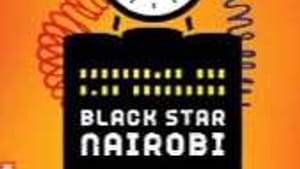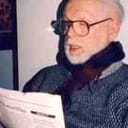Stay in the Loop
BSR publishes on a weekly schedule, with an email newsletter every Wednesday and Thursday morning. There’s no paywall, and subscribing is always free.
Truth is stranger (and more inspiring, too)
"Black Star Nairobi': Kenyan fiction and fact

Mukoma wa Ngugi, in spite of his Kenyan monicker, was born in Champaign, Illinois, where his already famous novelist father, Ngugi wa Thion'go, was teaching at the University of Illinois. Nonetheless, Mukoma grew up in Kenya before returning to the U.S. for both his undergrad and graduate education. (I see more and more un-American writers pursuing this double life.) Currently he's a 42-year-old professor English at Cornell University.
That background accounts for many aspects of Black Star Nairobi, his new crime novel set in Kenya. The narrator Ishmael, for example, is a former a cop in Madison, Wisconsin, a university town much like Ithaca, New York, where the author now teaches. Ishmael's pals are O (the Kenyan family name is underpronounceable and easily forgotten), a Kenyan policeman who has escalated to keeping terrorism in check, and Muddy, a good looking Rwandan woman who has survived that historical horror to become O's wife-to-be.
The action opens with their discovery of a black man who has been nearly consumed by wild animals in the forest where they were making their rounds. They think it's Al Qaeda they're tracking, but in disintegrating Kenya nothing could be so simple. As they return to Nairobi to investigate an explosion at a major hotel, the town is alive with an empathic celebration of that Kenyan son, Barack Hussein Obama. Yes, It's 2008.
Tangling with radicals
Their search for terrorists is unending. Failing to stop terrorism in Kenya, they scheme to track their hidden foes in California— Berkeley, no less. The three pals get there by flying to Mexico, where they tangle with the longest border in America. Oakland displays its radical face, and their international investigation reveals more aspects of the sneaky terrorists.
Back to Nairobi, where their skill at uncovering deceptions culminates in their preventing the demolition of a huge Jomo Kenyatta monument decorating the Kenyan International Conference Center. It's a fascinating adventure, spiced up with juicy descriptions of Kenyan life.
Meanwhile, in real life…
But a strange real-life coincidence interrupted my reading. As I connected for my daily dosage of the BBC on the Internet, I found one Catherine Fellows exploring with fascinating detail the defects of Kenya's prison system. Kenya has very few pro bono lawyers, in part because the few who do engage in such work don't pick up their pittance until the end of the process— that is, until Ms. Fellows interviewed an ex-con who never committed the crime for which he served 13 years.
This particular ex-con started studying law in prison in order to defend himself. He did, and he was discharged. Subsequently he persuaded other convicts to join his Law Behind Bars program; thanks to his (and her) idealism, some 3,000 Kenyan prisoners will soon be discharged. (For the full story, click here.) That's a much greater story than the simulated attack on terrorism in Black Star Nairobi.
That background accounts for many aspects of Black Star Nairobi, his new crime novel set in Kenya. The narrator Ishmael, for example, is a former a cop in Madison, Wisconsin, a university town much like Ithaca, New York, where the author now teaches. Ishmael's pals are O (the Kenyan family name is underpronounceable and easily forgotten), a Kenyan policeman who has escalated to keeping terrorism in check, and Muddy, a good looking Rwandan woman who has survived that historical horror to become O's wife-to-be.
The action opens with their discovery of a black man who has been nearly consumed by wild animals in the forest where they were making their rounds. They think it's Al Qaeda they're tracking, but in disintegrating Kenya nothing could be so simple. As they return to Nairobi to investigate an explosion at a major hotel, the town is alive with an empathic celebration of that Kenyan son, Barack Hussein Obama. Yes, It's 2008.
Tangling with radicals
Their search for terrorists is unending. Failing to stop terrorism in Kenya, they scheme to track their hidden foes in California— Berkeley, no less. The three pals get there by flying to Mexico, where they tangle with the longest border in America. Oakland displays its radical face, and their international investigation reveals more aspects of the sneaky terrorists.
Back to Nairobi, where their skill at uncovering deceptions culminates in their preventing the demolition of a huge Jomo Kenyatta monument decorating the Kenyan International Conference Center. It's a fascinating adventure, spiced up with juicy descriptions of Kenyan life.
Meanwhile, in real life…
But a strange real-life coincidence interrupted my reading. As I connected for my daily dosage of the BBC on the Internet, I found one Catherine Fellows exploring with fascinating detail the defects of Kenya's prison system. Kenya has very few pro bono lawyers, in part because the few who do engage in such work don't pick up their pittance until the end of the process— that is, until Ms. Fellows interviewed an ex-con who never committed the crime for which he served 13 years.
This particular ex-con started studying law in prison in order to defend himself. He did, and he was discharged. Subsequently he persuaded other convicts to join his Law Behind Bars program; thanks to his (and her) idealism, some 3,000 Kenyan prisoners will soon be discharged. (For the full story, click here.) That's a much greater story than the simulated attack on terrorism in Black Star Nairobi.
What, When, Where
Black Star Nairobi. By Mukoma Wa Ngugi. Melville House, 2013. 288 pages; $15.95 (paperback). www.amazon.com.
Sign up for our newsletter
All of the week's new articles, all in one place. Sign up for the free weekly BSR newsletters, and don't miss a conversation.

 Patrick D. Hazard
Patrick D. Hazard